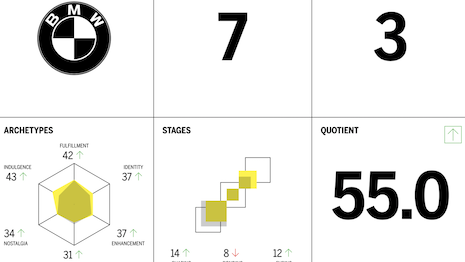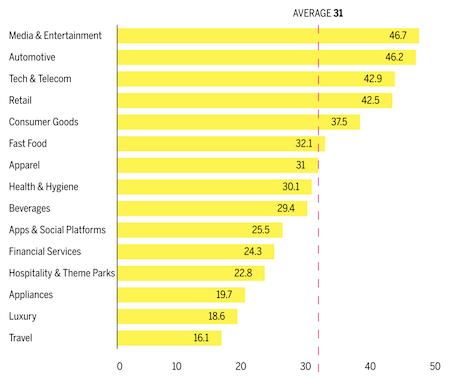German automaker BMW ranked No. 7 out of 10 on MBLM’s Brand Intimacy ranking, which measures deep connections between customers and brands.
Brand intimacy is a marker of deep customer connections and loyalty, which are attributes that the luxury market seeks to establish. And yet, aside from BMW, the luxury category ranked well below average.
"Building emotional connections and strong bonds is the best way to ensure your brand is maximizing its opportunities and increasing its relevancy, profitability, and revenue," the report said.
 BMW ranked No. 7 on MBLM's Brand Intimacy Study 2020. Image courtesy of MBLM
BMW ranked No. 7 on MBLM's Brand Intimacy Study 2020. Image courtesy of MBLM
Brand intimacy leaders
Marketers that make the brand intimacy list excel at creating a two-way relationship rather than a traditional anonymous yesterday.
These companies create emotional connections with customers by engaging them on a deep level. Consumers trust these brands and are highly influenced by them.
The MBLM report includes feedback from 6,200 consumers across the United States, Mexico and the United Arab Emirates, sharing their experiences with almost 400 brands across 15 industries.
Companies on this list have a higher average revenue growth rate than S&P Global and Fortune 500 companies.
Consumers are more willing to pay 20 percent more for highly intimate brands than for brands with lower levels of intimacy.
BMW was the only luxury brand on MBLM's top 10 list for the company's Brand Intimacy Study 2020, and earned an average quotient of 55.
The brand tracked behind Amazon (68.3), Disney (67.8), Apple (66.8), Ford (64.9), Jeep (60) and Netflix (59.2). Chevrolet (54.5), Walmart (53.9) and Sony Playstation (53.3) rounded out the rest of the Top 10 list.
Seventeen percent of those surveyed said they cannot live without the brand. The majority of customers have owned the brand for several years: 25 percent for 3-5 years, 23.3 percent for 6-10 years, and 27.5 percent for more than 10 years.
Twenty-nine percent of those surveyed said they would be willing to pay more for the brand.
With its high standards of design, attention to customer service and digital innovations such as virtual showrooms, BMW is a cutting-edge brand that is cutting through the clutter.
“As has been the case over the past decade, intimate brands continue to outperform established financial indices for both revenue and profit," the report said.
 Luxury falls below the average in brand intimacy per category. Image courtesy of MBLM
Luxury falls below the average in brand intimacy per category. Image courtesy of MBLM
Rankings by industry
The average brand intimacy score is 31, but automotive skews much higher than other categories.
Second only to the media and entertainment category at 46.7 points, automotive earned 46.2 points.
Retail and consumer goods also ranked above average with scores of 42.5 and 37.5, respectively.
Apparel was average at 31.
Luxury ranked near the bottom of the list with an average brand intimacy score of 18.6, indeed ranked second-to-last.
Travel was the lowest ranking category with a score of 16.1.
"Brand is an essential asset that helps facilitate demand, encourages growth, ensures consistency of users, and creates advantage," the report said.
"Despite a dramatically evolving world and shifting habits related to purchase and consumption, most approaches to marketing and branding have not changed in decades."
{"ct":"AkbLJLVIIUG3eWxhdbB0ZeKWdVVkiiYcMZgpqRWFHSmcGUe9mia+cJ\/mNITHuTtIkQ+FLejhlCWOvHC6f39vL6W+eIlX2f9gKEBmWRVzsXyVNRYGTG9ySFSLaFqWHd9F1cnn2Kpac6GiycU6DAE968kuNC1kPxJ8CqFQ6WUQdcrJJw8iFMZcp3DbA255hOH97hX95q22IATEo2WDQbbBEVgh7V7Vs9MnJsvMe3t8P0evTb7z6390Q8st62v5DOftJDLFnHooz01fR79jvkgZJpeVnJoI2vWloD8qJwfbcQeTJftASAP+nUjhVwHXJVEkechL+k7aYuDoa7XUti4VBIZAROWd4zCPsu+moIPTXIScIybVkgf\/t3HZJKb6gO74fn8YQkZH+hPy1lVuS8YVAtrAVaiLXwKQ37zbXQPLorhl\/Ymlz57576Lg5r9bT5yOo1aRWOQ2b6X2CqeuDhlTg4miE3Q3dIwrqoF61Vi31TDRn1sIjrnX3D0gErpVdwmXJ65Gwy\/f7q\/BVc6xRUFPYKGbS3PROkSm\/oTWVk2mCVgeQh1ow5PvvuB0b\/WHJskuwm64tLA55W8U7pEKJicrzcn9YV3gzaxnplTsczP\/s6JdFMMIom6izACVDqXL3WfLV4oOMrdicvmp4u+XpHUdjmVfBzfl+Xib0YlkF48HPAnS2K70LO0+Zg\/pqmGbsbPh\/cdvCOXJsDjLXNQzCzzr0dm\/5Gvy6s6JPHg1FW6KAKN1+o3cOMHd0e4I7oalGjrUaH9U5pjh5FwHUBMsZyLWXx3S2KIXbfkEiBGMbt\/wD8KfuS40nB9umFMgxS6KKKC5nRBS6TgPW2gA6FO8LXUzOYuYIJMXeM9qrsBmZpKZjvk+DVmHe1EQy\/SIILtlXqslJm+IZ37BZ5L\/OI33lQt2WNgFIKDVeHTm2NsQrH\/DESfWmhQ7Wyo8kqZikuZ7FjU7WJHh7Syia5T+3h+1oChC1i\/m1GViqqtghhR64bw9spxhYIqRlbErni1X+ZxNLlZUAWfrSjHJrDi+fY4\/zr+OWNO1hBqPR5vbLpYkZ2VpSjz4JKY1i+LHyqngKMTFYMFCjJMsVnWbCt86mGxZfQPkBDHQLwPGQV77yyuyCfSBXz+mCcpv1FFf4K7gr1l0cmZhI++CUsxDzScK9RJKbCvvMFi8wis3E3zHTLy2NSfGSDASFMob42ahPbml8qJpocBe\/UCsbAFGvFk96TYW2eIWNo749wL60bU4tx5w8y8M++Geky+7HJToFxWe6O5+9WHnfHsdOVYHR8y4A39LWc86iIS+3vH5i9LWTgMOHwfy97plxGdDTgG6ILPLqXl6h5O1\/gd7njgrKEfc+W822enCSXTYpegfdH\/DjPQq3rz1GbK+Y4AZx2YUF8L7QndWQRUajIrZRSTRNM5pfapR3tyNmetEj8s+1lP0luQaf2ZHGaCfNqKttEwohz5VPFjzYNZM+96m6OEgNHlkonHTHXVMgf+8+Zf4QdocbGWn0+9Q70I75afDt6q\/cFyezs9yfTlC6KosfPRQ7SKLYnt7t5JiCgbuUgeR4TKB9HTcMzpj6F0sHIdyHp2nrVkPri6gtXH7hPQWrfnMU3S2W15ZEvQzRwMg1ZP62YQaTABuXHdo0heogMBxcrXgDsCbbD9aw7JHy3btg7EUEG+Xkrft0vfCOm4hXPN18kMAA+MgT5a+TU+VbKcpW4eDPzIh8cp9ORjX8IE7HsHVrQoeaOu+sBQFvmyVVD6MF8FIeDhh4eMCu+mj22U0350XCzTSYNaDOGnWQeFzchSKWdEC9QwbknFDTvxnw907YisnHdxCMJkAtVqhVfTmwxh5kQ2430IBjeEAzCWMheHTG2KSnRa2CsE4UriIMzBYoddnVoqzuv12FkLcW8INYl+EaazKjMwHuv4pHrPVaZdRQllXtvbggvyBBjZDgTx7tBaUXXRdYAhxAYC9lr2flMserTSbXWJgc4ZSiUnAOQQpNtKj+PS6Nk1QLNC\/PgB3zNCWE6SQYEpwYeWyDu3ZjcjigJN\/UphXuRg8DM+xEKjt1TnelFUfuOIpXr7ZGIB9WavsG3th1sk34n0uGXNnIuije2UO8jPEZXuvh5P\/faCXwHKHXWgsUxE8f2RjCfhhroosDh3IS+mFBkC1WaWIj3\/owg0kyyf8Z48b9jv34zVwSOOnG0ahlQnZCvwGVJephp05nryJzd4sT0zILjMUvFB7kjvYYFpCQHRdLXEDVHi9EiGEOwlxE2TI2jHo2gb66cQhPwB0Kc15crOVSsupHcRq1EUFzNsU5I76YqwC89Tg\/dfjGgeoL8O9M7pq6ZZRAhYgc9j0r3vhLVGN6K3v7Qv7pEeyaKJeJbRYLQyVRgRto0L2jVW0tFaAE43g+a6XbkYl+vW\/NzRYL4SvAYIesVMmEe3NdAY3CJ8IZqZ9gk2w19quNaXSzE2Ail94R9UsyAFYXk3LIiFY\/rEUslYT9R1XzvjG0CEsTP2MiYhkem35Vo192Doe2dPmynAw5Btlc\/x1E08mFK7oN50wb6gSfkiT8UYVzSEOUnT75adhPiJaSxsto8mUAG9WmZ3FvFGro3ZaUFpqdF2XmHyBZ\/AoJivBaPqggdlW76qeqclsyJ9vwr+2jb3uuM7mexdMJDygfba1VovU6vv50H0HBXZsY3keO2dYZ3IXMm10to9ScrY2c9KCzso1Qj4UDMwkQ5oSO4IRiaCkIDRwYquNuLxAGPwTFz8KEknBghUCHWNyTDlxQBywFTC8jnYT0bLiUKq7gTgqzujv+YaxU3+rFFC22DHJTcTKjfIBIVTXX+evVkX2Xgk\/js1wPpA45CtWZrAEPdeWNlyZC42+WvDtmsIxWyQp1QWdNU7dngSLLJ3CBIc\/lCI6muPKV3nj2M3S8Ya15KkHtvgFFoBxhEqGe09Lf1BBVkg3edK9+8WQxRxbQZ0K7itQF6RxiQA\/QoY5xtj7ob1I0FcXq5aoQE6+tyqNi0ebipi+d\/s+KgHd4b+HL+hAo0nlCq+DWQqiSJ8MjKId8QIawtG9FmJoS+oyte3EQfklPCGIY0hiAm67YOiKDQqB3Y4faCCoNNH1b70uoiRylj\/0NBy42QZGs0+VANfs4vzkwhCfBZKp4ggb8Ujo0kPkDKR5C8xh9IuwtybupBGeDqTh31I699sbf5cN6aOduVzXjT\/JVKQORJHFGdTvZOEkDCeQZedR+7KiLzDlK5yMX5iHVSvB0tUg7ZE9SP9FaZY+CE\/n3LQFEqMzrHBWJHnSEt+cXmuSlxtEIQkP6fPHFeAZFcAwBWia\/3rsRsMDbqdFThee0aUWFjDkLhas60JTiEPhB5uLshFmmULZiN2QxpOzCBKy+LuOq9GwkDWO\/EzricjLAIC42fT6L64y8iYmYa3xAbGoOm9xaokxkDGcrOESWqydstuBN5OTIf120xnU6uU1rgHHKg1vjl6+YaUdTk37XMR88MKqP59bShEzLj0uWpibTetbQV6ksthBgLB2Yak6RZymephAqtxMx1Feddyx+b8fFps+nEK8x2px48jitGNudYhUv\/PRXhGDtVRpYOddjFFdQEtkqzuzsw\/OqcMzfYxbtlE86T\/fr0s2lnUI0oX5uCFrMTHb5\/WgvmNG\/5Q1podZe37SD5AlVJkI8uberCHkaSQidVWKfTM4p\/XYv\/7OQZNQ+3C\/65i0jKKFquU8n71i4fuU6TMj8Vv8Pmt7\/9sGOsPERXJZp71kjhYBEqDDO1jpIXshnjGXyRKZtQZtsYCW7wCQm0gHoTPkD9Cm4NIrn3Mb0Algwj0cXYfA1BJgFXjMpmhmqMtWFVjotMCF1k94Df0iop9WTzUQOvIFhGSlvNvFt68kLvsKMUsAzYlCHkqUDWHm0O2mN7pNUPeOY1Ti\/gxBJ0exVJaPQRQj9ndz2+VhnuSxGZjCPxNRR4rXX0+BfIEPF1mDHChxQlfbuHYafIrGTaE5JHzLXPsQZbwWMZ+uHRFyKcXDHmlGLIz3uFWHrodFHf\/5qe\/MytA3kxj4v9TOsn1Q65ISuGHYBZfw5Yg4UaJCEudokSwXUQtdbcq6NrIBZDW5HTsjLxpy1rauHQ8I8Hc\/XVAIIIcFRoltnjoR4Kx88kZypdjarVgYra9bwTe9G+Ys9pLsdfqGDY3zSybYHvdYSSAdAYn40X4GZwYgdbkX57s7j1uYymClfD8MPITfnBX9A189wK6dtvIAxN9l822vXycHlEcvg1mMq36Ysrr5JHIu\/Ukx9m5qpYlVy306A1vq\/cn8zjGvex2bs8VQ\/qOOqOV85kXnpt7kXqtUo\/dk3ziz7Fzb0FzCjDFVNAx0wnJ1RT3MkyhaoH6VC8vjiQvF0mFPKvGi7\/YCtkWQ3cTiO8cPfgPcoy0X6zBqJziwrQ3\/16hyW10v2a63h5libxAoADkPUV7jkT99SY4ZEJFrD\/nBCaTw3ubEfBzWnWFudvAFJZWM93k7fre7hbN3pxnmRanYZc1qjVxN4Dpd4oyAQsrTWu3eel3klVwmVU6IVco1MC4IIomLgeAkkJfDOPZQezdVN++AVEe6t5zsSeOdJGQULZSEnmoJUB8CtUYKt8dg8GR+1pd3iu\/mw0b4gN+ciDpelBK3m8+ifKitNnnC29pOH\/2+UDo3PcAPxg21tvcEceAYfrUxkBdA1dHa2GClYACQ65tA3Hf93s0SHqN7x9ExOkRTjuVdq5MoCmjQhXjgweaHRjZ+Z6Jrs9NnZucqUJgg+Tf4qVcf\/4ehun\/fQ9NzjD8DJ1mb0otvF849cWshNvE0qA0xiRLeUEhdNSiMg8O41ldPrSHZlNGUNsjlWRJgvLwTns++QeWMKuNDAbE6L2W3j9WIeDlII7Kz7VM5ggI1IgZ5FcyrPRZBXIUMTNjowfqswhRsqSKpKzVndvSmP6Akjq7clwdKoz8fkzf\/iDlW0TemscHVA25fXpqGNaywz54w4etlty2XTzxvt3JFKjJpu12NvjrXN3hpyxpZeExsDW+7wK8CoslP+0Vv3WqbsuN0SZLvmRl9XSE79FnD7GdfoZhG2Nd20c7qSfLu3Hs2t0q1pozWaeskhIxfwBhIe8HKYLikHMDQWOi+cVzgnq+nkqkXwicpBdXlyISKf1v7\/DT7cZVzWcangDktxNTLcQUC\/ps8Y+zqiFltS1wesHMrPSseU663daxe\/8soIARVYk2ecY7jWfQ3RQ+6IIiwoo\/VaR6NmpRAEj\/HaJZdVPwr1XxuIDSaJH6MxpPSP7Lzi\/Isg3oeapczXMDPTFAJzyayN6RUUVwDr6wxUSd5pZ0E9e+GcaSrWc4xCv6DSuXEPvyhn4F0PdlRJDh\/57E9yz88bQdyGcdqkUvZVI15YabfTzldu9xGarwCml3d2yD6OewQW2buOll50vTvrtEop1q8BRyDmw7z1LOe9kz0s9h2rlTaEUmcTRkxTP0Jl1r6e7x4gnJ6RhYvx7QNd8pVx++wbWvqt++CyAjQ4O86JpXh5wXIwLnARfEfdMJXeApUooCY+2urGX0UblfrJtxB9CkOFYwdx8nvrFFkKRIKubH4C0g72zgDiKPbi8uhLP5Z8v\/qpOcvGCTrIWgsBu8kckgpQ+z3tcPWGt6MxqZARXU6X6lmzeKZg8CSv2+N2goxuLANyjo8iG0HqplUKwqGnm6mnW6+IUyKuZGKUGB6mgdHT0StQLVPaBLOweF\/elVaMUS3l0sbOAc8x+h5gti1YYW\/3zWS5\/PmsT309y1hZDnVkQH8Kd9AKbQZJxP+Sl7rnoww2gXdlboQsQSUUCEC8KNQQ0bZkh6WyRi8qGxNBHey9AgEiD8RjkREvq81Lyal80xs3aRre\/oJ+iDWEgaDEaR6tEOq4lpAiW5YrZJ07lCZK+dfIvDSbZYbNqlkfyRQHE7I5z97vbBDlEcwO4s+U4qPPkORUFCwgEVCtPG6\/0y+pSqAhGgCOlJsgKYa+70xJLnNFsB5ABg\/NDj4Bn58dYL+EwJfyIn1xsYmqqotlKbcGmv6h3YD4CuwfMYMR+197g9j5a3+XQo5ab1rug+fTbcAauL37TJnePnGAtB5iMyNK5xmMz13rHJWepx5G5Bo7vUUO5pyalrUChljOCOyxS4MFfMR3IrLdXR42phZj3tKT7BmlzK9Wakz6GJ3Y+cOYH6YBnlEbbsLF\/PoNYYmycMMrimqexlDVCCoWUFStDKjhb+8rHviqFHf+F0I6HSboI6X6XzNygAE+OpWdz81OrFM6Fg5CwitlQ3zMBdPe+xDtg5G+gyhe9J7rDfPoHlFBX0vKJA3mVO2s+cVSAw06AYf7J0958cnpLSy\/b2b0BlThtvde8rJp\/0\/juYbZ\/xQ0LvfR28mZ+8C7CXxconDjjOFKzd4JZfq0GHbPKHpS\/2O1ziGuYuSd9LnUHuh1Ld+GfkTvo\/tgcslJd+bN\/7uHnrOeYRWBLaE6I8=","iv":"cd99e150d81b22e4124e0759932130f6","s":"821fa3b1599c6c3f"}

 MBLM's Brand Intimacy Study 2020 explores how brands are building stronger connections with stakeholders. Image courtesy of MBLM
MBLM's Brand Intimacy Study 2020 explores how brands are building stronger connections with stakeholders. Image courtesy of MBLM
 BMW ranked No. 7 on MBLM's Brand Intimacy Study 2020. Image courtesy of MBLM
BMW ranked No. 7 on MBLM's Brand Intimacy Study 2020. Image courtesy of MBLM Luxury falls below the average in brand intimacy per category. Image courtesy of MBLM
Luxury falls below the average in brand intimacy per category. Image courtesy of MBLM